Our editors independently select these products. Making a purchase through our links may earn Well+Good a commission
Fact: There’s a lot of healthy eating styles out there. It seems like every few years there’s a new one that generates all sorts of buzz in the wellness world. In the ’90s, The Zone Diet was all the rage (you can thank Jennifer Aniston for that one), 2009 marked the birth of Whole30 (still popular, especially in January), and in 2018, you couldn’t escape from talk about the ketogenic diet. But while some healthy diets’ popularity may fluctuate over time, there’s one that’s maintained a large following from the very beginning: the vegan diet.
Experts in This Article
registered dietitian and plant-based chef based in St. Louis, MO
registered dietitian nutritionist and diabetes specialist in Los Angeles, California
Veganism, aka the shunning of all animal foods and products, has existed for centuries. Some evidence suggests it dates all the way back to 500 b.c. Hinduism, Buddhism, and Jainism have long promoted plant-based diets for ethical reasons. The modern vegan movement in the West can be traced to 1944, when The Vegan Society was founded by Donald Watson. Watson called a meeting with six vegetarians, who in addition to not eating meat, didn’t eat dairy. They then established The Vegan Society (and the eating principles that go along with it) for a reason many people choose to go vegan today: better treatment for animals.
The founding members of The Vegan Society defined veganism as “a philosophy and way of living which seeks to exclude—as far as is possible and practicable—all forms of exploitation of, and cruelty to, animals for food, clothing or any other purpose; and by extension, promotes the development and use of animal-free alternatives for the benefit of humans, animals and the environment. In dietary terms it denotes the practice of dispensing with all products derived wholly or partly from animals.”
It’s been seven decades since that definition was written, and many people who choose to go vegan today still choose to do so because they are passionate about animal rights. But there are many more reasons that have compelled current vegans to take up the lifestyle. Here, registered dietitians detail what it means to be vegan now, why people may choose to do so, the benefits, risks, and also tips for how to go vegan, if that’s something you’re interested in trying. Consider this is your complete guide to everything you need to know about the vegan diet.
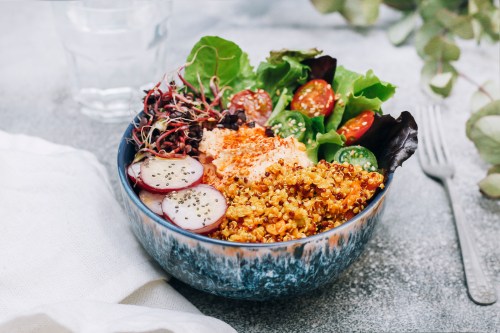
What is the vegan diet?
“A vegan diet excludes all animal products,” says registered dietitian Vandana Sheth, RD. She explains that what sets the vegan diet apart from other healthy eating styles is that the ethos behind the eating plan extends beyond just food. Many vegans do not buy or use anything that involved animals in the process of making it, which can include clothes and shoes, furniture, sports equipment (like leather footballs), or other goods.
In terms of food, Sheth says that some people use the terms “vegan” and “plant-based” interchangeably, but they are not the same, as demonstrated below:
- Vegan: A lifestyle that excludes animal products completely, including not just meat but also fish, dairy, eggs, honey, and additives and supplements derived from animal products.
- Vegetarian: An eating plan that excludes meat, poultry, eggs, dairy, and seafood.
- Ovo-vegetarian: An eating plan that allows eggs but excludes meat, poultry, seafood, and dairy.
- Pescatarian: An eating plan that excludes meat, eggs, and dairy, but allows fish.
- Lacto-vegetarian: An eating plan that excludes meat, eggs, and fish, but allows dairy.
- Plant-based: A diet based primarily on whole plant foods, but allows for meat, eggs, fish, and dairy in moderation.
As you can see, there are many different types of vegetarians, but there are not necessarily variations to the vegan diet. However, some people may choose to follow the dietary guidelines but not the lifestyle component. “I do have some clients who are vegan, but they do consume honey, or they still wear leather,” Sheth says. “There are gradations to it.”
It’s also a common misconception that people who follow a plant-based diet don’t eat animal products at all. There is absolutely still room in a plant-based diet for animal products; it’s just that the eating plan emphasizes whole plant-based foods such as vegetables, fruit, whole grains, beans, and legumes, and minimizes the consumption of foods from animals such as meat and dairy. In this way, it is very different from a vegan diet.
Registered dietitian Alexandra Caspero, RD, says that with her clients, she often finds the reasons differ for why someone may choose to be plant-based versus why someone may choose to go vegan. “Some reasons overlap, like concerns about the environmental impact on consuming meat, but I find that people who are vegan tend to be motivated by ethical reasons whereas people who choose to go plant-based may be more interested in the nutritional benefits, such as lowering the risk for heart disease or just wanting to eat more plants,” she says.
Even though the vegan diet has been around for a long, long time, there is surprisingly little scientific research on the long-term effects. Certainly more research needs to be done. There is, however, a large amount of research on the health effects of eating less animal products and eating more meat. To this end, there are many benefits likely connected to living a vegan life stemming from this research.
But both registered dietitians offer up a major caveat first: You’ll only reap the benefits if the vegan foods you fill your plate with are nutrient-dense ones, not junk food. (After all, Oreos are vegan.) But if you prioritize whole food plant-based sources such as fruits, vegetables, whole grains, beans, and legumes, you can expect to experience a wide range of benefits.
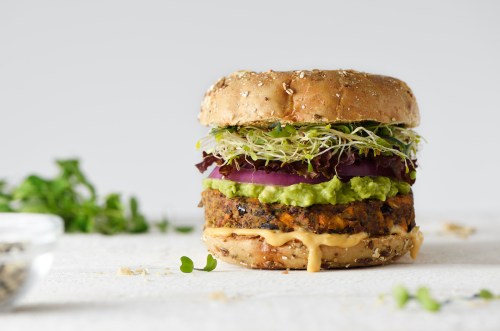
What you can and can’t eat on the vegan diet
Need a cheat sheet of what’s okay and not okay to eat? Use the below lists as a guide:
Foods to eat:
- Fruits
- Vegetables
- Beans and legumes
- Nuts
- Seeds
- Grains, including bread, rice, and pasta
- Maple syrup, cane sugar, coconut sugar, monk fruit, molasses, stevia, and agave
- Meat substitution products (optional)
- Dairy substitution products, including alternative milks, alt-yogurts, and alt-butters (optional)
- Vegetable fats and oils, like olive and avocado oils
Foods to avoid:
- All meat, including poultry
- All fish and seafood, including shellfish, crabs, and mussels
- Eggs
- All dairy, including milk, cheese, yogurt, butter, and ghee
- Whey protein
- Mayonnaise
- Any products made from bees, including honey and propolis (although some vegans make exceptions for honey)
- Gelatin or any products containing it (like marshmallows)
- Foods made with animal-derived byproducts or colorings (like castoreum, natural carbon, and carmine)
What are the benefits of the vegan diet?
1. It’s good for the environment
Caspero already mentioned one big benefit: It’s good for the environment. Last year, 37 doctors from 16 different countries released a report in the journal The Lancet detailing how different foods impact the environment. In news that will surprise no one, meat has the largest carbon footprint of any food source. You know what had the lowest? Fruits, vegetables, whole grains (including rice, quinoa, millet, and buckwheat), and legumes—all vegan staples. “When you look at the environmental impact of raising animals for mass consumption, it’s a powerful reason to eat less animals and more plants,” Caspero says. And for some people, the impact is enough to prompt them to go completely vegan.
2. Veganism is beneficial for heart health
There’s scientific evidence to suggest that sticking to a vegan diet is good for cardiovascular health. Researchers found that people who lowered their intake of animal products and increased the amount of plant-based foods they ate improved cardiovascular health, including lowering the rate for heart disease by 24 percent. This is because plants are good for your heart—they’re high in both antioxidants and fiber, nutrients that are directly linked to lowering cholesterol. Beans, a cornerstone protein for vegans, have also been linked to being beneficial for heart health.
3. It may reduce your risk of developing type two diabetes
“Not only can a vegan diet help prevent diabetes, but it can help in terms of management if you already have it,” Sheth, who is a certified diabetes educator, says. Researchers found that a diet emphasizing whole grains, fruits, vegetables, legumes, and nuts and reducing saturated and trans fats was linked to preventing type two diabetes. “Foods that are particularly therapeutic are whole grains, legumes, fruits and vegetables, and the compound found in many of these foods, polyphenols,” the study reads. Polyphenols are plant-compounds that have antioxidant properties and help control blood glucose levels. If your doctor has said you are at risk for developing type two diabetes, switching to a vegan diet may mitigate that risk.
4. Following a vegan diet could lower your risk for certain cancers
In a large-scale study of 33,883 meat-eaters and 31,546 non-meat eaters, researchers found that the non-meat eaters had a lower risk for major cancers. The researchers credited this to the fact that meat is higher in saturated fat than plant-based protein sources such as beans, legumes, and nuts. They also found that the non-meat eaters consumed more fiber, which also contributed to the decreased cancer risk.
5. Following a vegan diet is good for your gut
Vegans and vegetarians tend to have higher amounts of good bacteria in their guts than omnivores, thanks in large part to the increased amount of plants (and therefore, fiber) that plant-based style eaters consume. “Our gut microbes, they want fiber,” Will Bulsiewicz, MD, a South Carolina-based gastroenterologist and internationally recognized gut health expert, previously told Well+Good. “And it’s scientifically proven that the single greatest predictor of a healthy gut is a diversity of plants [in one’s diet].”
6. It could add years to your life
It may sound like an exaggeration, but scientific evidence suggests that when followed in a healthy way, a mostly vegan diet may add years to your life. Longevity expert and Blue Zones founder Dan Buettner found that plant-based eating (as in primarily eating plant foods and very rarely, if ever, eating meat and dairy), is a common thread in all five of the global Blue Zones communities. Additionally, one of the most common vegan sources of protein—beans—are themselves linked to living longer. “If you’re eating about a cup of beans a day, it’s probably worth an extra four years of life expectancy,” he said. While none are all-out vegan, eating a diet that’s primarily plants was a common thread he found in each region.
Risks and potential side effects of following the vegan diet
While it’s true that there are more vegan substitution products in grocery stores than ever before and restaurants are increasingly becoming more accommodating, eating vegan is inherently restrictive—making it potentially challenging to stick with. And despite the number of vegan products on the market, many vegans have trouble finding options that work for them at restaurants or in social settings. Because of this, it may not be the best eating plan for everyone.
Additionally, Sheth and Caspero both say that there are some nutrients that can be hard to find only in plants. That matters, because if you’re deficient in these nutrients, you can be at risk for both minor and major health problems. Here, they highlight the biggest nutrient needs vegans should prioritize, and how to ensure they get enough of the crucial vitamins and minerals that are necessary for healthy living.
1. Vitamin B-12
Vitamin B-12 keeps nerve and blood cells healthy, helps make DNA, and also provides the body with energy. Not getting enough can lead to fatigue and anemia. The average adult needs 2.5 micrograms of vitamin B-12 a day, and the biggest ways the majority of Americans meet this need is by eating meat, seafood, and eggs. “Vitamin B12 is found in these foods, but it’s also found in fortified foods such as cereals,” Caspero says. It’s also found in nutritional yeast, which vegans commonly use to give food a cheesy taste. Caspero says there are also vitamin B12 supplements, but if you are following a vegan diet for ethical reasons it’s important to check the source to see where the vitamin B12 is coming from, to ensure no animals were used as part of the process.
2. Iron
Iron is another nutrient that plays a role in energy production and blood function. (Aim to get 18 to 19 milligrams a day, more if you are pregnant or breastfeeding.) While meat is a common source for iron, Caspero says it’s certainly not the only one. “Dark leafy vegetables, whole grain pasta, and beans are all high in iron,” she says. “The difference is that iron in plants is harder to absorb because it isn’t bound in heme, the way it is in animals.” Because of this, she recommends pairing iron-rich foods with vitamin C-rich foods, which will help the nutrient be better absorbed in the body. “And it really isn’t hard to do this,” she says. “One easy combo is whole grain pasta and tomato sauce.” It might also be prudent to eat more plant-based iron, since it’s less bioavailable.
3. Zinc
Vegans also need to be mindful to get enough zinc, a nutrient that plays a critical role in the body’s immune system. (The average person needs eight milligrams a day.) “Beans are one great way vegans can make sure to get enough zinc,” Caspero says. Other vegan foods that are high in zinc include pumpkin seeds, cashews, and oatmeal.
4. Calcium
Since dairy is off the table for vegans, it’s important that they find other ways to get the 1,000 milligrams of calcium the body needs every day. Otherwise, there is a risk for deteriorating bone health, muscle function, nerve function, and unstable hormone levels. “Vegetables like collard greens and broccoli are very high in calcium,” Sheth says. “Also, most alternative milk and dairy products are fortified with calcium, so that is another way vegans can get enough as well.”
5. Omega-3 fatty acids
Since vegans don’t eat fish or eggs, they are at risk for not getting enough omega-3 fatty acids, which are important for both brain and heart health. “There are three types of omega-3 fatty acids that are important to get enough of: alpha-linolenic acid (ALA), eicosapentaenoic acid (EPA), and docosahexaenoic acid (DHA),” Caspero says, adding that the body doesn’t make EPA or DHA, so it’s extra important to get them from food. “Fatty fish is the primary way most people get EPA and DHA fatty acids, but you can get them from plant-based sources—it just goes through a conversion process that doesn’t happen with fish.” It’s recommended to get 1.1 grams of omega-3s a day, which can be done by consuming chia seeds, flaxseeds, or walnuts, which all contain ALA omega-3 fatty acids. The only plant-based source of DHA is algae, so if you choose to use a supplement for this type of fatty acid, check to make sure it’s sourced from algae and not fish.
One nutrient you won’t see on this list: protein. It’s a fallacy that getting enough protein is impossible if you don’t eat meat. While, just like meat eaters, it’s important to include a protein source with every meal, there’s no shortage of options that are both easy to find and affordable. Later, the dietitians will detail the healthiest swaps for meat, fish, dairy, and eggs.
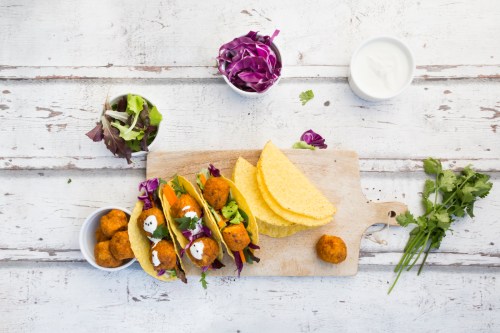
Healthy swaps for vegans
1. Vegan substitutions for meat
No meat? No problem. On average, beef has 16 grams per serving. Here are some smart vegan substitutes that can work as replacements when consumed in combination with other foods, according to Sheth and Caspero: Hemp (nine grams per three-tablespoon serving), lentils (22 grams per half cup), tempeh (20 grams per 100-gram serving), edamame (nine grams per one-third cup), tofu (nine grams per serving), chickpeas (20 grams per cup), and peas (eight grams per cup).
In terms of meat substitution products you can buy, there is no shortage on the market. Whether you’re looking for vegan burgers, hot dogs, or chicken, virtually every grocery store in the country is stocked with options. A few big brands to keep an eye out for: MorningStar Farms, Beyond Meat, Impossible Foods, Dr. Praeger’s, and Hilary’s.
However, it’s important to know that not all vegan meat products are healthy. Caspero says it’s important to check both the ingredients and nutritional panel to see if the product is made from whole food sources (and not loaded with additives) and is low in sodium.
Watch the video below to find out what a registered dietitian thinks about Impossible Foods and Beyond Burger:
2. Vegan substitutions for fish
While vegan fish substitution products aren’t as common as meat substitutions, they’re gaining in popularity and are becoming closer than ever to mimic real fish in both taste and nutrition. Brands including Good Catch, Sophie’s Kitchen, and Gardein have vegan fish products on the market that taste like the real thing while also including high amounts of plant-based protein and omega-3s. Just be sure to read the labels to ensure that the products aren’t overly processed and meet your particular nutrition needs.
3. Vegan alternatives for milk and other dairy products
Almond, soy, oat, rice, avocado…what can’t you milk? In terms of what the healthiest cow’s milk alternative is, there are different nutritional pros and cons of each. One that’s withstood the test of time for a reason: soy milk. “Nutritionally speaking, soy milk is the best plant-based milk because it contains as much protein as cow’s milk, but is low in calories,” registered dietitian Tracy Lockwood Beckerman, RD told Well+Good in an episode of You Versus Food. But she also adds that too much soy can negatively effect the thyroid. She also praises oat milk, the vegan milk darling of the moment. “Like whole oats, oat milk can provide energy and strengthen bones,” she says.
Watch the video below to learn more about which vegan milk is the healthiest:
The rise of vegan milk has trickled down to include vegan cheese and vegan yogurts, too, both of which not only taste like the real thing but are fortified to include the nutrients and healthy bacteria strains common in traditional dairy products. Some vegan cheese products you can find at the grocery store or online include Kite Hill, Treeline, and Miyoko’s Creamery. Some vegan yogurt brands to keep en eye out for are So Delicious, Oatly, and Ripple.
4. Vegan substitutes for eggs
“There are several vegan swaps for eggs, but the one to go for changes based on how you’re using it,” Caspero says. “If you’re making scrambled eggs, tofu works really well as a substitute. But if you’re baking, chia eggs work a bit better, which can be made by mixing one tablespoon of chia with three tablespoons of water.” Bananas, applesauce, and flax eggs (made by mixing one tablespoon of flax with three tablespoons of water) can also be used as substitutes for eggs. For a store-bought option, Just Eggs makes vegan eggs out of mung beans and tastes very similar to real eggs.
5. Vegan substitutions for honey
As Sheth mentioned, some vegans choose to consume honey, but for strict vegans, it is off the table. For those in the latter group, there are many other natural sweeteners to use in place of honey, depending on the taste and texture you’re hoping to achieve. Molasses and agave are two popular honey replacements since they have the same texture as honey and can be used in the same way.
How to switch to a vegan diet
1. Ease into it
If going vegan is something you’re interested in trying, both Caspero and Sheth offer up the same tip: Ease into it. “Start by just making little swaps or making a completely vegan meal once a week,” Sheth says. She also says to have fun with it and to experiment with different vegan foods and products to find ones that you love and can become staples in your diet.
“It’s a complete misconception that vegan diets are boring,” Sheth says. “There is no shortage of meals you can make or recipes to try that don’t include animal products.” Another misconception is that eating vegan is expensive. “Buying some of the trendy vegan substitution products can get pricy, but foods like beans, lentils, rice, fruits, and vegetables are all inexpensive vegan staples,” Caspero says. While vegan foods like these are available at almost every grocery store, there are also some online vegan markets that not only have these staples, but other vegan foods as well including Vegan Essentials and Billion Vegans.
2. Consider working with a registered dietitian
Caspero also recommends meeting with a registered dietitian—even virtually—to make sure that all your nutrient needs are being met and to make sure you’re switching to a new eating style in a healthy way. She also reiterates the importance of reading nutrition labels and ingredients lists; just because something is vegan doesn’t mean it’s necessarily healthy.
3. Be mindful of how you build you plate
If you’re looking for tips on how to structure a vegan plate so that it’s delicious and healthy, keep this formula in mind: 50 percent of your plate should be vegetables, 25 percent should be whole grains or healthy starches (like sweet potatoes), and 25 percent should be plant-based protein. Sprinkle fats, herbs, and spices throughout for seasoning and you’ve got yourself a literal recipe for success.
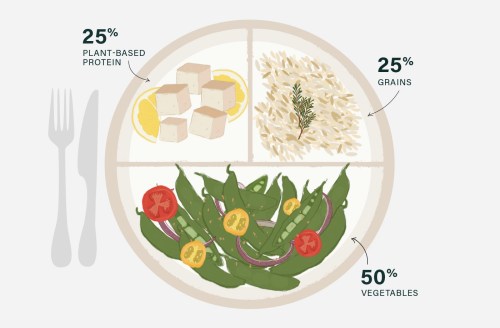
4. Search out vegan recipes to try online or in cookbooks
If you’re looking for more resources for your new vegan life, vegan cookbooks can be helpful tools. The Vegan Cookbook For Athletes by Anne-Marie Campbell, Plants Only Kitchen by Gaz Oakley, Vegan Recipes In 30 Minutes by Shasta Press, and Frugal Vegan by Katie Koteen are just a few of the many vegan cookbooks and guides that can help make eating vegan easier. There are also many healthy vegan recipe blogs, including Sweet Potato Soul, Dora’s Table, Minimalist Baker, and Post Punk Kitchen, that are all worth bookmarking.
With your kitchen stocked with substitutes and staples, and vegan recipes queued up, you’re ready to start your new vegan life. But what does it actually look like? Keep reading for a sample menu plan for following the vegan diet.
What a day following a vegan diet looks like
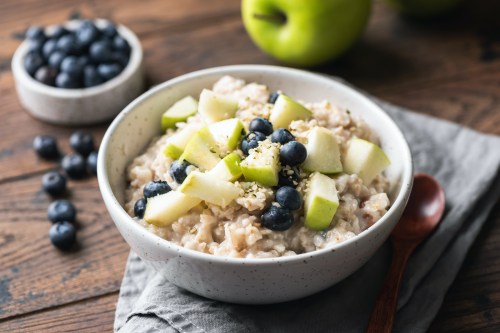
Arx0nt
Breakfast
Oatmeal, pancakes, papaya salad, vegan chia parfait, vegan smoothies…There’s no shortage of vegan breakfast ideas to choose from. Want a breakfast that delivers on fiber, protein, and healthy fats? Try oatmeal topped with nut butter and fruit.

Lunch
You definitely don’t have to stick with salad in order to go vegan for lunch. A Mediterranean bowl with quinoa, hummus, and veggies, spinach quesadillas (with vegan cheese), black bean soup, and a classic peanut butter and jam are all lunch ideas that are 100 percent vegan and can be made in less than 10 minutes.
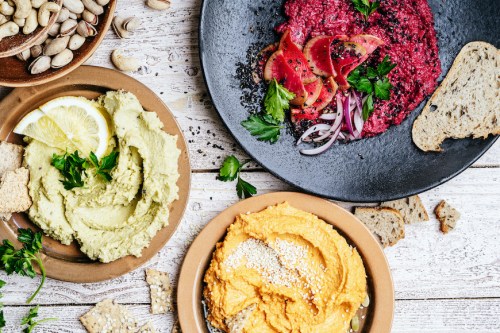
Snack
When that 4 p.m. snack craving hits, popcorn, hummus and veggies, or trail mix are all protein-rich vegan ways to get an energy boost. Or, try these vegan protein bites, made with vegan protein powder, nuts, cacao, and vanilla.
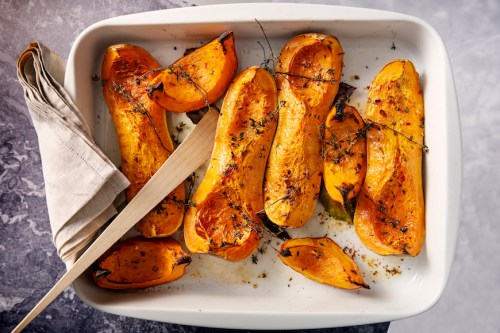
Dinner
Seasonal grain bowls, cauliflower-carrot lettuce wraps, butternut squash and quinoa chili, spaghetti squash pad Thai, and Mexican-style stuffed peppers are just a few vegan dinner ideas to experiment with.
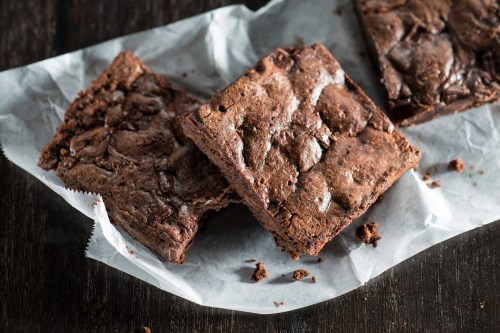
Dessert
When you follow the right recipe, vegan brownies, cheesecake, carrot cake, and avocado mousse can all be nutrient-rich desserts—no animal products needed!
With more vegan products, cookbooks, and blogs available, it’s easier than ever to give this eating style a try, if that’s something you are interested in doing. Once you figure out your favorite swaps and meals, you’ll likely find that it actually isn’t all that hard to stick with.
Originally published July 28, 2020. Updated October 16, 2020.
Oh hi! You look like someone who loves free workouts, discounts for cult-fave wellness brands, and exclusive Well+Good content. Sign up for Well+, our online community of wellness insiders, and unlock your rewards instantly.
Sign Up for Our Daily Newsletter
Get all the latest in wellness, trends, food, fitness, beauty, and more delivered right to your inbox.
Got it, you've been added to our email list.











